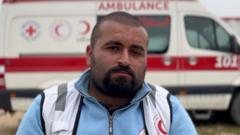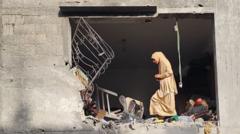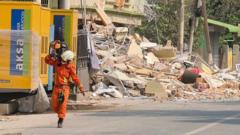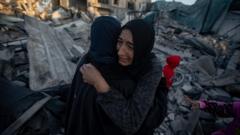With bakeries shutting down and hospitals rationing painkillers, the humanitarian situation in Gaza worsens dramatically after a month-long blockade, coinciding with the traditional Eid celebrations.
Crisis Deepens in Gaza as Bakeries Close Amid Continued Blockade
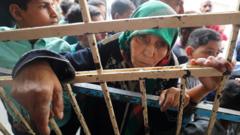
Crisis Deepens in Gaza as Bakeries Close Amid Continued Blockade
Following a month of blockade imposed by Israel, Gaza faces severe shortages of food and medical supplies, leaving residents in dire conditions.
A month has passed since Israel implemented a total blockade on Gaza, halting the entry of goods and significantly impacting the humanitarian landscape. All bakeries supported by the UN have now closed their doors, leaving shelves bare and markets devoid of essential fresh produce. This blockade, marking the longest yet in the ongoing conflict, coincides with the Muslim holiday of Eid al-Fitr, leaving many Gazans facing dire food shortages.
"This is the worst Eid for us," lamented Um Ali Hamad, a displaced resident. "We have no food or drinks, and we can't even enjoy the festivities. We're exhausted." Locals reported severe scarcity in basic commodities like vegetables and cooking oil, with some struggling to secure even one meal a day amid the complete absence of charity food allocations.
The blockade, imposed on March 2, followed Hamas's refusal to advance discussions on a ceasefire agreement. Israeli officials argue the measures are necessary due to Hamas's alleged hoarding of supplies, while international aid organizations assert the need for humanitarian access to the region.
Numerous agencies are now urging global powers to pressure Israel into allowing essential goods into Gaza, warning that the situation could rapidly devolve into widespread starvation. “The month-long ban is appalling,” stated ActionAid, as women like Abu Alaa Jaffar shared the despair caused by bakery closures—essential for the staple food of bread.
Despite Israeli claims that sufficient provisions are stored within Gaza, UN representatives declare they are nearing the limits of their supplies, compelling humanitarian organizations to ration what little they have left. With the WFP set to halt hot meal distributions within days and the UNRWA indicating they also face severe shortfalls, a humanitarian crisis looms.
In the medical sector, hospitals are running low on critical supplies like antibiotics and anesthetics. Overburdened by casualties, many facilities face dire challenges in treating injured patients, as basic healthcare necessities dwindle. Dr. Mark Perlmutter described a grave situation in which medical staff had to resort to unsanitary methods for surgical procedures.
The international community, including Médecins Sans Frontières, condemns the blockade as a form of collective punishment and calls for immediate action to restore essential humanitarian aid. Meanwhile, Israel stands firm in its military operations, which have resulted in over a thousand Palestinian casualties since renewed hostilities began in March, fueling fears of further escalation.
As diplomatic efforts to revive a ceasefire continue, prospects for relief in Gaza remain uncertain. With crucial supplies running low and local markets decimated, the plight of residents grows increasingly desperate as the blockade persists.












